中考英语倒装句练习题及答案含解析
中考英语倒装句100及答案经典

中考英语倒装句100及答案经典一、倒装句1.—Peter has made great progress in English recently.— . He has been studying so hard these days.A. So have heB. So he hasC. So he haveD. So has he【答案】 B【解析】【分析】句意:——彼得最近在数学反面取得重大进步。
——他就是这样,这些天他一直在努力学习。
在表示和上述发生相同事情时,用so+助动词+主语。
对别人情况加以肯定时常用,so+主语+助动词。
根据He has been studying so hard these days.可知是对上述事情的肯定。
主语是第三人称单数,助动词用has,故选B。
【点评】此题考查倒装结构。
主语部分倒装So+助动词+主语。
和So+主语+助动词。
两个句式区别。
2.—He's never been late for school.—________________.A. So have IB. So am IC. Neither have ID. Nor am I【答案】 C【解析】【分析】句意:—他从来没有上学迟到过。
—我也没有。
So+助动词+主语,表示主语也是;neither+助动词+主语,表示主语也不是这样;根据上文是现在完成时,这里用助动词have。
根据题意,故选C。
【点评】考查固定句型neither+谓+主。
3.—My brother and I will go to the library tomorrow.— . Shall we go together?A. So do IB. So I doC. So will ID. So I will【答案】 C【解析】【分析】“so+助动词(情态动词或连系动词)+另一主语”,此句型是主谓倒装结构,可以表示前面的情况也适用于后者,使用该句型需要注意以几个方面的问题:1.该句型只能用于肯定句,不能用于否定句:如果前句是否定句,则要用“neither /nor +助动词+主语”。
初三英语倒装句特殊情况练习题30题含答案解析
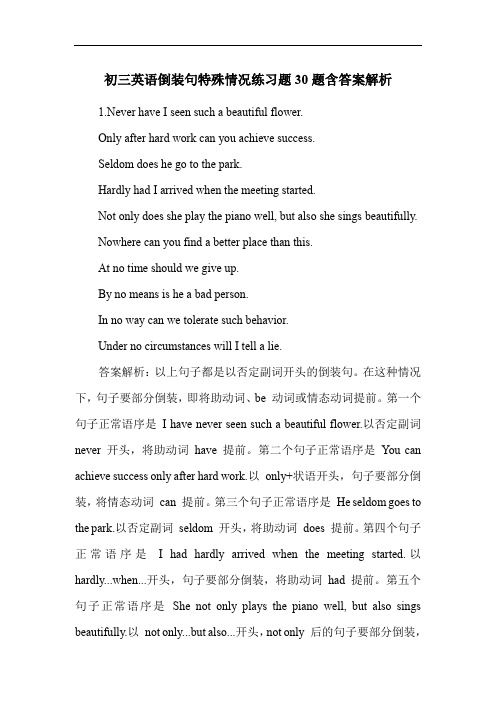
初三英语倒装句特殊情况练习题30题含答案解析1.Never have I seen such a beautiful flower.Only after hard work can you achieve success.Seldom does he go to the park.Hardly had I arrived when the meeting started.Not only does she play the piano well, but also she sings beautifully.Nowhere can you find a better place than this.At no time should we give up.By no means is he a bad person.In no way can we tolerate such behavior.Under no circumstances will I tell a lie.答案解析:以上句子都是以否定副词开头的倒装句。
在这种情况下,句子要部分倒装,即将助动词、be 动词或情态动词提前。
第一个句子正常语序是I have never seen such a beautiful flower.以否定副词never 开头,将助动词have 提前。
第二个句子正常语序是You can achieve success only after hard work.以only+状语开头,句子要部分倒装,将情态动词can 提前。
第三个句子正常语序是He seldom goes to the park.以否定副词seldom 开头,将助动词does 提前。
第四个句子正常语序是I had hardly arrived when the meeting started.以hardly...when...开头,句子要部分倒装,将助动词had 提前。
(英语)初中英语倒装句题20套(带答案)及解析
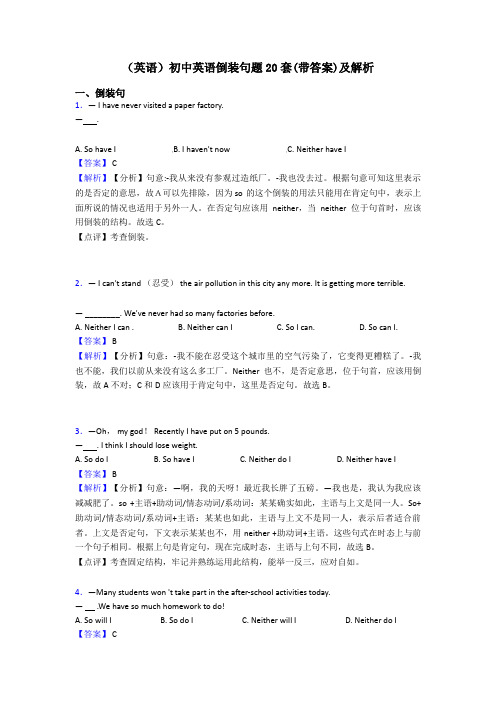
(英语)初中英语倒装句题20套(带答案)及解析一、倒装句1.— I have never visited a paper factory.— .A. So have IB. I haven't nowC. Neither have I【答案】 C【解析】【分析】句意:-我从来没有参观过造纸厂。
-我也没去过。
根据句意可知这里表示的是否定的意思,故A可以先排除,因为so 的这个倒装的用法只能用在肯定句中,表示上面所说的情况也适用于另外一人。
在否定句应该用neither,当neither 位于句首时,应该用倒装的结构。
故选C。
【点评】考查倒装。
2.— I can't stand (忍受) the air pollution in this city any more. It is getting more terrible.— ________. We've never had so many factories before.A. Neither I can .B. Neither can IC. So I can.D. So can I.【答案】 B【解析】【分析】句意:-我不能在忍受这个城市里的空气污染了,它变得更糟糕了。
-我也不能,我们以前从来没有这么多工厂。
Neither也不,是否定意思,位于句首,应该用倒装,故A不对;C和D应该用于肯定句中,这里是否定句。
故选B。
3.—Oh, my god! Recently I have put on 5 pounds.— . I think I should lose weight.A. So do IB. So have IC. Neither do ID. Neither have I【答案】 B【解析】【分析】句意:—啊,我的天呀!最近我长胖了五磅。
—我也是,我认为我应该减减肥了。
so +主语+助动词/情态动词/系动词:某某确实如此,主语与上文是同一人。
初三英语倒装句练习题50题(答案解析)
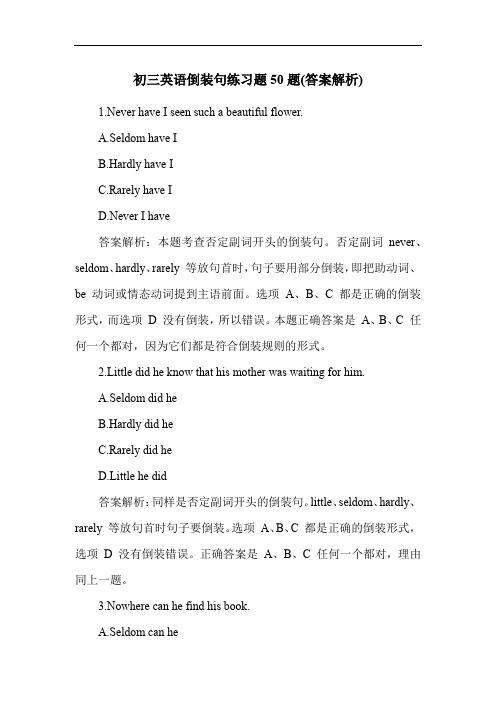
初三英语倒装句练习题50题(答案解析)1.Never have I seen such a beautiful flower.A.Seldom have IB.Hardly have IC.Rarely have ID.Never I have答案解析:本题考查否定副词开头的倒装句。
否定副词never、seldom、hardly、rarely 等放句首时,句子要用部分倒装,即把助动词、be 动词或情态动词提到主语前面。
选项A、B、C 都是正确的倒装形式,而选项D 没有倒装,所以错误。
本题正确答案是A、B、C 任何一个都对,因为它们都是符合倒装规则的形式。
2.Little did he know that his mother was waiting for him.A.Seldom did heB.Hardly did heC.Rarely did heD.Little he did答案解析:同样是否定副词开头的倒装句。
little、seldom、hardly、rarely 等放句首时句子要倒装。
选项A、B、C 都是正确的倒装形式,选项D 没有倒装错误。
正确答案是A、B、C 任何一个都对,理由同上一题。
3.Nowhere can he find his book.A.Seldom can heB.Hardly can heC.Rarely can heD.Nowhere he can答案解析:nowhere 放句首,句子倒装。
选项A、B、C 虽然也是否定副词开头的倒装形式,但与nowhere 意思不同。
选项D 没有倒装错误。
正确答案是nowhere can he,即本题没有其他可替代选项。
4.Not until he came back did I leave.A.Seldom until he came back did I leaveB.Hardly until he came back did I leaveC.Rarely until he came back did I leaveD.Not until he came back I left答案解析:not until 放句首,主句要倒装。
初三英语倒装句练习题50题含答案解析
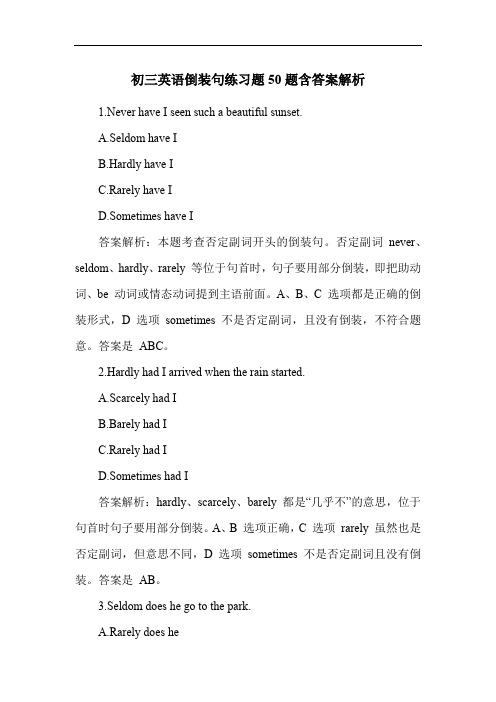
初三英语倒装句练习题50题含答案解析1.Never have I seen such a beautiful sunset.A.Seldom have IB.Hardly have IC.Rarely have ID.Sometimes have I答案解析:本题考查否定副词开头的倒装句。
否定副词never、seldom、hardly、rarely 等位于句首时,句子要用部分倒装,即把助动词、be 动词或情态动词提到主语前面。
A、B、C 选项都是正确的倒装形式,D 选项sometimes 不是否定副词,且没有倒装,不符合题意。
答案是ABC。
2.Hardly had I arrived when the rain started.A.Scarcely had IB.Barely had IC.Rarely had ID.Sometimes had I答案解析:hardly、scarcely、barely 都是“几乎不”的意思,位于句首时句子要用部分倒装。
A、B 选项正确,C 选项rarely 虽然也是否定副词,但意思不同,D 选项sometimes 不是否定副词且没有倒装。
答案是AB。
3.Seldom does he go to the park.A.Rarely does heB.Never does heC.Often does heD.Sometimes does he答案解析:seldom、rarely、never 都是否定副词,位于句首时句子要部分倒装,A、B 选项正确。
C 选项often 是肯定副词,D 选项sometimes 不是否定副词且没有倒装。
答案是AB。
4.Never in my life have I tasted such delicious food.A.Seldom in my life have IB.Hardly in my life have IC.Rarely in my life have ID.Sometimes in my life have I答案解析:never、seldom、hardly、rarely 位于句首时句子要用部分倒装,A、B、C 选项正确。
初三英语倒装句练习题50题答案解析版

初三英语倒装句练习题50题答案解析版1. In the middle of the room ____ a large table.A. standsB. standC. standingD. stood答案:A。
解析:完全倒装句的结构是“表语/状语+谓语+主语”。
此句中“in the middle of the room”是地点状语位于句首,句子要用完全倒装。
主语是“a large table”为单数,根据句子时态一般现在时,所以谓语动词用第三人称单数形式stands。
B选项stand用于主语是复数的情况;C选项standing不是谓语形式;D选项stood是一般过去时,不符合句子时态。
2. There ____ a lot of people at the concert last night.A. wasB. wereC. isD. are答案:B。
解析:在“there be”句型中,当表示某地有某物或某人时,be动词的形式取决于后面的主语。
这里“a lot of people”是复数,句子时态是一般过去时,所以要用were。
A选项was用于单数主语;C选项is是一般现在时的单数形式;D选项are是一般现在时的复数形式。
3. Out ____, with a stick in his hand.A. did he rushB. rushed heC. he rushedD. he did rush答案:C。
解析:当表示方位的副词out位于句首时,如果主语是代词,句子不用完全倒装,而是采用正常语序。
这里主语是he,所以是he rushed。
A选项did he rush是部分倒装形式;B选项rushed he 是完全倒装形式,但不适用于主语是代词的情况;D选项he did rush 这种形式不符合正常用法。
4. ____ from the mountain, the city looks very beautiful.A. SeeB. SeenC. SeeingD. To see答案:B。
中考英语倒装句真题汇编(含答案)及解析
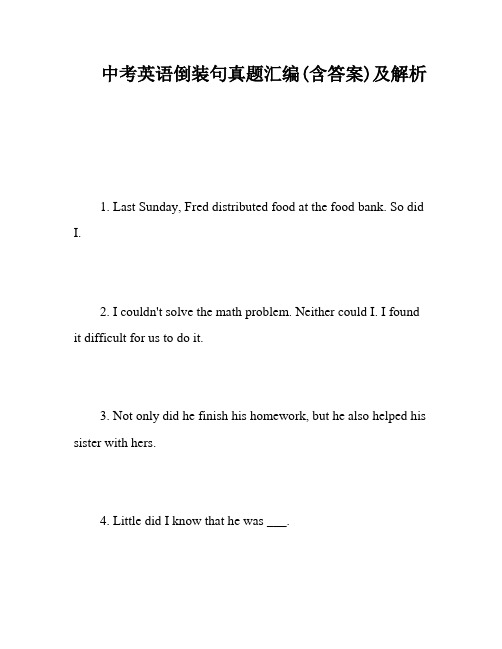
中考英语倒装句真题汇编(含答案)及解析1. Last Sunday, Fred distributed food at the food bank. So didI.2. I couldn't solve the math problem. Neither could I. I found it difficult for us to do it.3. Not only did he finish his homework, but he also helped his sister with hers.4. Little did I know that he was ___.5. Only when we have enough knowledge can we solve the problem.6. Hardly had I ___ when the power went out.7. In no way can we allow this kind of r to continue.8. Rarely have I seen such a beautiful sunset.9. Under no circumstances should you give up.10. Seldom do we have the ___.解析:本题考查seldom+倒装结构。
根据题意,表示“我们很少有机会出国旅行”,需要使用seldom+do+主语的倒装结构。
选项符合要求。
Yes, I can feel it. I need to ___.A. So it is.B. So is it.C. So isthe weather. D. So does it.【答案】C【解析】【分析】句意:——这些天天气很冷。
——是的,我能感觉到。
我需要多穿衣服。
根据句意可知,需要对天气进行肯定回答,so+主语+谓语,故选C。
中考英语倒装句练习题(附答案)

典型例题: (1) Not until the early years of the 19th century___ what heat is. A. man did know B. man knew C. didn‘t man know D. did man know 答案为D. 否定词Not在句首,要求用部分倒装的句子结构。
注意:只有当Not only… but also连接两个分句时,才在第一个分句用倒装结构。如果置于句首的Not only… but also仅连接两个并列词语,不可用倒装结构。
01
Not only you but also I am fond of music.
01
so, neither, nor作部分倒装。
Not until the early years of the 19th century ___ what heat is.
答案D。看到Not until…的句型,我们知道为一倒装句,答案在C,D 中选一个。
A. man did know B. man know C. didn‘t man know D. did man know
01
Try hard as he will, he never seems able to do the work satisfactorily.
02
注意:
注意:
01
让步状语从句中,有though,although时,后面的主句不能有but,但是 though 和yet可连用。
02
其他部分倒装。
Not until I began to work ___ how much time I had wasted.
didn‘t I realize
中考英语倒装句完形填空题20题答案解析版
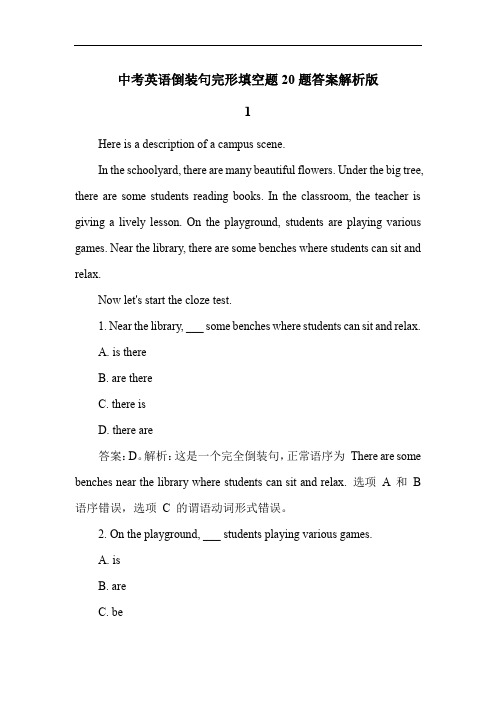
中考英语倒装句完形填空题20题答案解析版1Here is a description of a campus scene.In the schoolyard, there are many beautiful flowers. Under the big tree, there are some students reading books. In the classroom, the teacher is giving a lively lesson. On the playground, students are playing various games. Near the library, there are some benches where students can sit and relax.Now let's start the cloze test.1. Near the library, ___ some benches where students can sit and relax.A. is thereB. are thereC. there isD. there are答案:D。
解析:这是一个完全倒装句,正常语序为There are some benches near the library where students can sit and relax. 选项A 和B 语序错误,选项C 的谓语动词形式错误。
2. On the playground, ___ students playing various games.A. isB. areC. beD. being答案:B。
解析:这也是完全倒装句,正常语序为There are students playing various games on the playground. 选项A 谓语动词形式错误,选项C 缺少相应的主语和表语,选项D 缺少谓语动词。
【英语】 中考英语倒装句专项训练100(附答案)

【英语】中考英语倒装句专项训练100(附答案)一、倒装句1.Only _________ save his life.A. can the doctorB. the doctor canC. will the doctorD. could the doctor【答案】 B【解析】【分析】句意:只有医生能挽救他的生命。
分析:only的倒装中一定注意他的用法,只有当only+状语(从句)至句首是才倒装这儿很明显是在强调主语doctor所以不用倒装,故选B【点评】倒装句的用法。
2.— I can't stand (忍受) the air pollution in this city any more. It is getting more terrible.— ________. We've never had so many factories before.A. Neither I can .B. Neither can IC. So I can.D. So can I.【答案】 B【解析】【分析】句意:-我不能在忍受这个城市里的空气污染了,它变得更糟糕了。
-我也不能,我们以前从来没有这么多工厂。
Neither也不,是否定意思,位于句首,应该用倒装,故A不对;C和D应该用于肯定句中,这里是否定句。
故选B。
3.—He's never been late for school.—________________.A. So have IB. So am IC. Neither have ID. Nor am I【答案】 C【解析】【分析】句意:—他从来没有上学迟到过。
—我也没有。
So+助动词+主语,表示主语也是;neither+助动词+主语,表示主语也不是这样;根据上文是现在完成时,这里用助动词have。
根据题意,故选C。
【点评】考查固定句型neither+谓+主。
4.—Oh, my god! Recently I have put on 5 pounds.— . I think I should lose weight.A. So do IB. So have IC. Neither do ID. Neither have I【答案】 B【解析】【分析】句意:—啊,我的天呀!最近我长胖了五磅。
初三英语倒装句深度练习练习题20题含答案解析
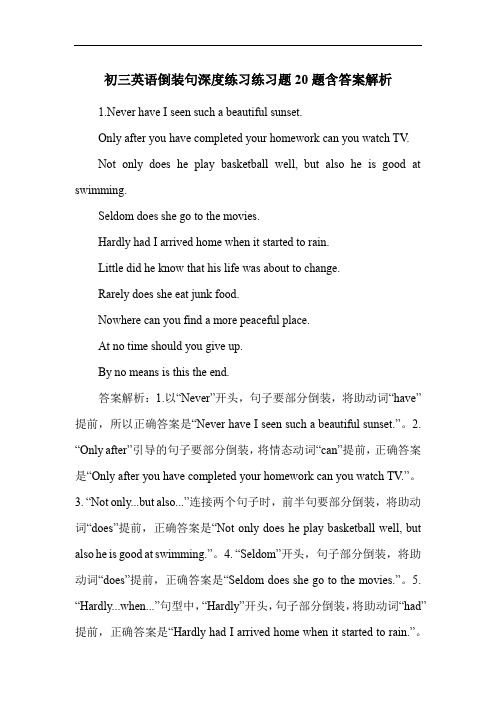
初三英语倒装句深度练习练习题20题含答案解析1.Never have I seen such a beautiful sunset.Only after you have completed your homework can you watch TV.Not only does he play basketball well, but also he is good at swimming.Seldom does she go to the movies.Hardly had I arrived home when it started to rain.Little did he know that his life was about to change.Rarely does she eat junk food.Nowhere can you find a more peaceful place.At no time should you give up.By no means is this the end.答案解析:1.以“Never”开头,句子要部分倒装,将助动词“have”提前,所以正确答案是“Never have I seen such a beautiful sunset.”。
2. “Only after”引导的句子要部分倒装,将情态动词“can”提前,正确答案是“Only after you have completed your homework can you watch TV.”。
3. “Not only...but also...”连接两个句子时,前半句要部分倒装,将助动词“does”提前,正确答案是“Not only does he play basketball well, but also he is good at swimming.”。
4. “Seldom”开头,句子部分倒装,将助动词“does”提前,正确答案是“Seldom does she go to the movies.”。
初三英语倒装句练习题50题含答案解析
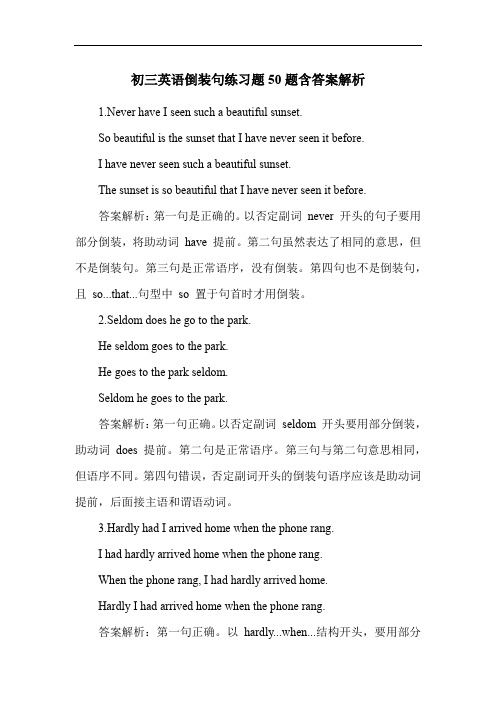
初三英语倒装句练习题50题含答案解析1.Never have I seen such a beautiful sunset.So beautiful is the sunset that I have never seen it before.I have never seen such a beautiful sunset.The sunset is so beautiful that I have never seen it before.答案解析:第一句是正确的。
以否定副词never 开头的句子要用部分倒装,将助动词have 提前。
第二句虽然表达了相同的意思,但不是倒装句。
第三句是正常语序,没有倒装。
第四句也不是倒装句,且so...that...句型中so 置于句首时才用倒装。
2.Seldom does he go to the park.He seldom goes to the park.He goes to the park seldom.Seldom he goes to the park.答案解析:第一句正确。
以否定副词seldom 开头要用部分倒装,助动词does 提前。
第二句是正常语序。
第三句与第二句意思相同,但语序不同。
第四句错误,否定副词开头的倒装句语序应该是助动词提前,后面接主语和谓语动词。
3.Hardly had I arrived home when the phone rang.I had hardly arrived home when the phone rang.When the phone rang, I had hardly arrived home.Hardly I had arrived home when the phone rang.答案解析:第一句正确。
以hardly...when...结构开头,要用部分倒装,将助动词had 提前。
第二句是正常语序。
中考英语倒装句解题技巧讲解及练习题(含答案)

中考英语倒装句解题技巧讲解及练习题(含答案)一、倒装句1.–I usually go hiking with my friends.-- ____do I.A. NorB. SoC. Neither【答案】 B【解析】【分析】句意:一一我经常和朋发一起去徒步旅行。
一一我也是。
肯定句后跟”so+谓语+主语“,表示某人某物也……;否定句后跟"Neither/Nor+谓语+主语”,表示某人某物也不……。
本题前句是肯定句,故选B。
2.—Zhou Ming likes reading English magazines.—_______. It's good for English learning.A. So do IB. So am IC. So I do【答案】 A【解析】【分析】句意为:—周明喜欢读英语杂志。
—我也是。
这对英语学习由好处。
So+助动词+主语,完全倒装,表示“.......也......”。
故选A。
【点评】考查倒装句3.—More and more people prefer to walk rather than ride in cars.—________. Walking is good for health.A. So they areB. So are theyC. So they doD. So do they【答案】 C【解析】【分析】句意:——越来越多的人比起开车更喜欢走路。
——确实如此,走路对健康有好处。
A他们也是,B是啊,C是啊,D他们也是。
根据 Walking is good for health,可知表示确实是这样,起强调作用,用so+主语+助动词,因此排除B和D;再根据谓语prefer,实义动词,和主语people可知,应用助动词do,故选C。
【点评】考查倒装句,注意理解倒装句so do they和陈述句so they do的意义及用法区别。
中考英语倒装句练习题40题含答案解析
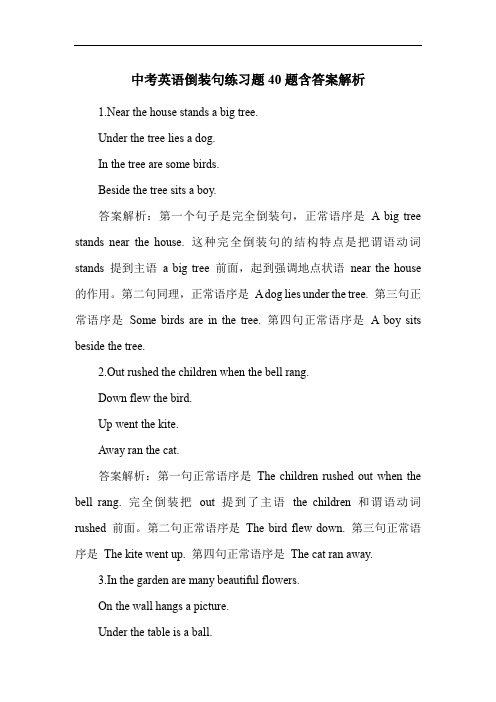
中考英语倒装句练习题40题含答案解析1.Near the house stands a big tree.Under the tree lies a dog.In the tree are some birds.Beside the tree sits a boy.答案解析:第一个句子是完全倒装句,正常语序是 A big tree stands near the house. 这种完全倒装句的结构特点是把谓语动词stands 提到主语a big tree 前面,起到强调地点状语near the house 的作用。
第二句同理,正常语序是A dog lies under the tree. 第三句正常语序是Some birds are in the tree. 第四句正常语序是 A boy sits beside the tree.2.Out rushed the children when the bell rang.Down flew the bird.Up went the kite.Away ran the cat.答案解析:第一句正常语序是The children rushed out when the bell rang. 完全倒装把out 提到了主语the children 和谓语动词rushed 前面。
第二句正常语序是The bird flew down. 第三句正常语序是The kite went up. 第四句正常语序是The cat ran away.3.In the garden are many beautiful flowers.On the wall hangs a picture.Under the table is a ball.Beside the door stands a man.答案解析:第一句正常语序是Many beautiful flowers are in the garden. 完全倒装结构把are 提到了主语many beautiful flowers 前面。
初三英语倒装句练习题20题答案解析版

初三英语倒装句练习题20题答案解析版1. Only when the work is done ____ be able to go back home.A. you haveB. you willC. will youD. have you答案:C解析:“only + 状语从句”位于句首时,主句要用部分倒装,即将助动词、be动词或情态动词提到主语之前。
本句中,从句是一般现在时,主句表示将来的动作,所以要用will提到主语you之前。
A和B 选项没有倒装,不符合语法规则。
D选项中have用于完成时态,这里不需要,所以也不正确。
2. Not only ____ interested in football but also ____ good at it.A. he is; he isB. is he; is heC. he is; is heD. is he; he is答案:D解析:“not only...but also...”连接两个分句,当not only位于句首时,第一个分句要用部分倒装,即将be动词、助动词或情态动词提到主语之前,第二个分句不用倒装。
所以第一个空是is he,第二个空是he is。
A选项没有倒装;B选项第二个分句也倒装了,错误;C选项顺序错误。
3. Seldom ____ computer games ever since he entered college.A. did he playB. he playedC. has he playedD. he has played答案:C解析:“seldom”为否定副词,位于句首时句子要用部分倒装。
句子中有“ever since”引导的时间状语从句,主句要用现在完成时。
A选项是一般过去时的倒装形式,不符合时态要求;B选项没有倒装;D 选项没有倒装。
4. So loudly ____ that everyone in the room could hear him clearly.A. did he speakB. he spokeC. was he speakingD. he was speaking答案:A解析:“so + 副词”位于句首时,句子要用部分倒装。
中考英语倒装句超特级综合单选题30题(含答案)
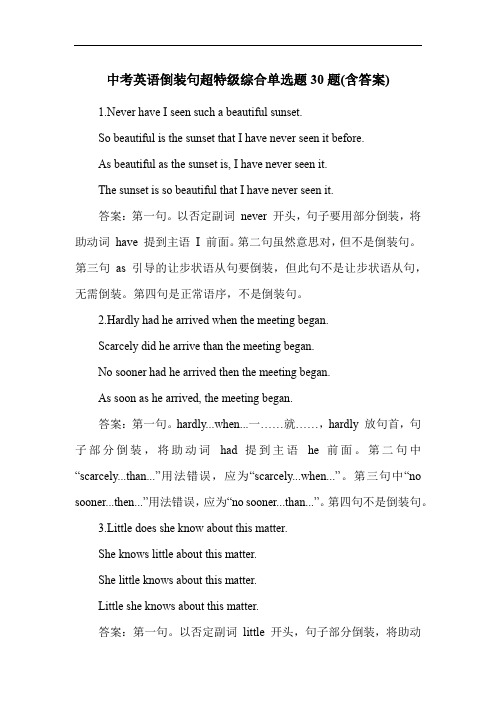
中考英语倒装句超特级综合单选题30题(含答案)1.Never have I seen such a beautiful sunset.So beautiful is the sunset that I have never seen it before.As beautiful as the sunset is, I have never seen it.The sunset is so beautiful that I have never seen it.答案:第一句。
以否定副词never 开头,句子要用部分倒装,将助动词have 提到主语I 前面。
第二句虽然意思对,但不是倒装句。
第三句as 引导的让步状语从句要倒装,但此句不是让步状语从句,无需倒装。
第四句是正常语序,不是倒装句。
2.Hardly had he arrived when the meeting began.Scarcely did he arrive than the meeting began.No sooner had he arrived then the meeting began.As soon as he arrived, the meeting began.答案:第一句。
hardly...when...一……就……,hardly 放句首,句子部分倒装,将助动词had 提到主语he 前面。
第二句中“scarcely...than...”用法错误,应为“scarcely...when...”。
第三句中“no sooner...then...”用法错误,应为“no sooner...than...”。
第四句不是倒装句。
3.Little does she know about this matter.She knows little about this matter.She little knows about this matter.Little she knows about this matter.答案:第一句。
中考英语倒装句练习题40题答案解析版

中考英语倒装句练习题40题答案解析版1. Only when he reached the tea - house ______ it was the same place he'd been in last year.A. he realizedB. realized heC. did he realizeD. he did realize答案:C解析:本题考查部分倒装。
only + 状语从句放在句首时,主句要用部分倒装,即将助动词、be动词或情态动词提到主语之前。
原句正常语序为He realized it was the same place he'd been in last year only when he reached the tea - house。
A和D选项是正常语序,不符合要求。
B选项形式错误。
C选项did提到主语he之前,是正确的部分倒装形式。
2. Not until all the fish died in the river ______ how serious the pollution was.A. did the villagers realizeB. the villagers realizedC. the villagers did realizeD. didn't the villagers realize答案:A解析:not until位于句首时,句子要部分倒装。
其正常语序为Thevillagers didn't realize how serious the pollution was until all the fish died in the river。
B和C选项是正常语序。
D选项中多了一个否定词not,不符合题意。
A选项将助动词did提到主语the villagers之前,是正确的部分倒装形式。
3. - I don't like reading newspapers. - ______.A. So do IB. Neither do IC. So I doD. Neither I do答案:B解析:本题考查部分倒装。
【中考英语】倒装句专项练习题(含答案解析)

【中考英语】倒装句专项练习题(含答案解析).1、—Oh, my god! Recently I have put on 5 pounds.—____. I think I should lose weight.A.So do IB.So have IC.Neither do ID.Neither have I【答案】B【解析】【分析】句意:—啊,我的天呀!最近我长胖了五磅。
—我也是,我认为我应该减减肥了。
so +主语+助动词/情态动词/系动词:某某确实如此,主语与上文是同一人。
So+助动词/情态动词/系动词+主语:某某也如此,主语与上文不是同一人,表示后者适合前者。
上文是否定句,下文表示某某也不,用 neither +助动词+主语。
这些句式在时态上与前一个句子相同。
根据上句是肯定句,现在完成时态,主语与上句不同,故选B。
【点评】考查固定结构,牢记并熟练运用此结构,能举一反三,应对自如。
2、—He could hardly understand what was being read,___________?—________________ could I. But he thought his English was perfect.A.could he; NeitherB.can he; NorC.couldn't he; SoD.couldn't he; Neither【答案】A【解析】【分析】句意:——他几乎不理解读的是什么,是吗?——我也不知道。
但是他认为他的英语是完美的。
hardly所在的句子是否定句,在变成反义疑问句时,反义部分应用肯定形式could he。
根据 But he thought his English was perfect. 可知我也不理解(他读的)。
英语中neither +情态动词+主语,是一个部分倒装结构,表示前者的情况也适合于后者;前一句是否定句,倒装结构应用neither,故选A。
(英语)中考英语倒装句题20套(带答案)及解析

(英语)中考英语倒装句题20套(带答案)及解析一、倒装句1.– Will Tony go for the picnic at the weekend?– If I don't go, ______.A. so does heB. neither will heC. neither he does【答案】 B【解析】【分析】neither+主语+谓语,表示对前句所说内容的肯定,neither+谓语+主语,表示前句所说情况也适用于后者,句意:Tony周末去野餐吗?如果我不去,他也不去。
前句情况也适用于后者,所以用倒装,故选B。
【点评】考查倒装句的用法。
2.—He's never been late for school.—________________.A. So have IB. So am IC. Neither have ID. Nor am I【答案】 C【解析】【分析】句意:—他从来没有上学迟到过。
—我也没有。
So+助动词+主语,表示主语也是;neither+助动词+主语,表示主语也不是这样;根据上文是现在完成时,这里用助动词have。
根据题意,故选C。
【点评】考查固定句型neither+谓+主。
3.—Many students won 't take part in the after-school activities today.— .We have so much homework to do!A. So will IB. So do IC. Neither will ID. Neither do I【答案】 C【解析】【分析】句意:—今天许多学生不愿意参见课外活动。
—我也不愿意。
我们有那么多作业要做。
So+助动词+主语,表示与前面的肯定形式一致,表示也。
Neither+助动词+主语,表示与前面的否定形式一致,表示也不。
这两种部分倒装结构中的助动词与前一句的助动词一致,根据Many students won 't take part in the after-school activities today.可知此处won't表示否定形式,故用Neither+will+主语,故选C。
初三英语倒装句试题答案及解析
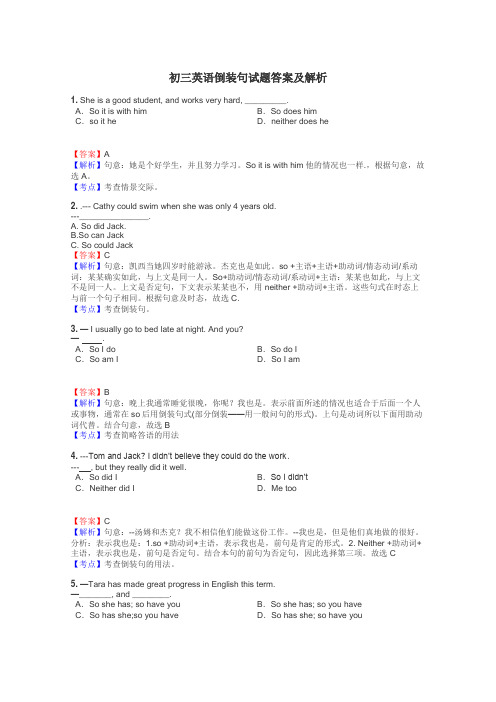
初三英语倒装句试题答案及解析1. She is a good student, and works very hard, _________.A.So it is with him B.So does himC.so it he D.neither does he【答案】A【解析】句意:她是个好学生,并且努力学习。
So it is with him他的情况也一样.,根据句意,故选A。
【考点】考查情景交际。
2. .--- Cathy could swim when she was only 4 years old.---_______________.A. So did Jack.B.So can JackC. So could Jack【答案】C【解析】句意:凯西当她四岁时能游泳。
杰克也是如此。
so +主语+主语+助动词/情态动词/系动词:某某确实如此,与上文是同一人。
So+助动词/情态动词/系动词+主语:某某也如此,与上文不是同一人。
上文是否定句,下文表示某某也不,用 neither +助动词+主语。
这些句式在时态上与前一个句子相同。
根据句意及时态,故选C.【考点】考查倒装句。
3.— I usually go to bed late at night. And you?— .A.So I do B.So do IC.So am I D.So I am【答案】B【解析】句意:晚上我通常睡觉很晚,你呢?我也是。
表示前面所述的情况也适合于后面一个人或事物,通常在so后用倒装句式(部分倒装——用一般问句的形式)。
上句是动词所以下面用助动词代替。
结合句意,故选B【考点】考查简略答语的用法4. ---Tom and Jack? I didn’t believe they could do the work.--- , but they really did it well.A.So did I B.So I didn’tC.Neither did I D.Me too【答案】C【解析】句意:--汤姆和杰克?我不相信他们能做这份工作。
- 1、下载文档前请自行甄别文档内容的完整性,平台不提供额外的编辑、内容补充、找答案等附加服务。
- 2、"仅部分预览"的文档,不可在线预览部分如存在完整性等问题,可反馈申请退款(可完整预览的文档不适用该条件!)。
- 3、如文档侵犯您的权益,请联系客服反馈,我们会尽快为您处理(人工客服工作时间:9:00-18:30)。
中考英语倒装句练习题及答案含解析一、倒装句1.——My brother and I will go to the library tomorrow.—— ___. Shall we go together?A. So I doB. So do IC. So will ID. So I will【答案】 C【解析】【分析】句意:---明天我弟弟和我将要去图书馆。
---我也要去。
我们能一起去吗?表示某某人也一样,用So+be/助动词/情态动词+主语。
明天要去,应用情态动词will。
故选C。
【点评】考查倒装句的用法。
2.— I can't stand (忍受) the air pollution in this city any more. It is getting more terrible.— ________. We've never had so many factories before.A. Neither I can .B. Neither can IC. So I can.D. So can I.【答案】 B【解析】【分析】句意:-我不能在忍受这个城市里的空气污染了,它变得更糟糕了。
-我也不能,我们以前从来没有这么多工厂。
Neither也不,是否定意思,位于句首,应该用倒装,故A不对;C和D应该用于肯定句中,这里是否定句。
故选B。
3.— I think the plan is just a waste of time. What do you think?— Well, if you don't support the plan, ________.A. neither do IB. so do IC. neither will ID. so will I【答案】 C【解析】【分析】句意:——我认为这个计划只是在浪费时间。
您是怎么想的?——好,如果你不支持这个计划,我也不支持。
Neither+助动词+主语,表示主语也不是……;这里是if引导的条件状语从句,主句用一般将来时,从句用一般现在时态,这里是主句,故助动词用will。
根据题意,故选C。
【点评】考查倒装句,注意Neither+助动词+主语,表示主语也不是这样;so+助动词+主语,表示主语也是这样。
4.—He's never been late for school.—________________.A. So have IB. So am IC. Neither have ID. Nor am I【答案】 C【解析】【分析】句意:—他从来没有上学迟到过。
—我也没有。
So+助动词+主语,表示主语也是;neither+助动词+主语,表示主语也不是这样;根据上文是现在完成时,这里用助动词have。
根据题意,故选C。
【点评】考查固定句型neither+谓+主。
5.— My mother hardly watches any sports shows.—_________A. So do mine.B. So does mine.C. Neither do mine.D. Neither does mine.【答案】 D【解析】【分析】句意:—我妈妈几乎不看任何体育节目。
—我的妈妈也不看。
当A做的事,B和A做了相同事时,B说“So+助动词/情态动词…+B”;当A没做某事,B也没做,B 可说“Neither/nor+助动词/情态动词…+B”。
mine指的是my mother,根据主谓一致原则,可知使用助动词does,结合句意和语境可知选D。
【点评】此题考查倒装结构和情景交际。
6.—I didn't go to Tom's birthday party yesterday. What about you?—________, because I was preparing for the exam all the time.A. Neither was IB. Neither am IC. Neither did ID. Neither do I【答案】 C【解析】【分析】句意:昨天我没有去汤姆的生日宴会,你呢?——我也没去,因为我一直准备考试。
根据倒装句neither助动词-主语,表示主语也没去做上面的那件事情,根据题意可知是用一般过去时故助动词用did。
故选C。
【点评】考查特殊句式,本题涉及倒装句neither助动词-主语。
7.—I didn't go to the cinema yesterday. What about you?—____________, because I was preparing for the project all the time.A. Nor do IB. Neither did IC. Neither am ID. Nor was I【答案】 B【解析】【分析】句意:—我昨天没有去电影院,你的?—我也没去,因为我一直在准备这个项目。
根据句意及题干分析此题是过去也没去,所以选B。
8.—We are not allowed to bring any snacks or drinks at the school meeting.— .A. Neither are weB. Neither do weC. So are weD. So do we【答案】 A【解析】【分析】句意:—我们在学校会议上不被允许带任何零食和饮料。
—我们也是。
根据We are not allowed可知此处表示否定,并且助动词用are,故表示我们也不被允许,用Neither are we。
故选A。
【点评】表示与前面肯定句的情况一样,用句型So+助动词+主语。
表示与前面否定句的情况一样,用句型Neither +助动词+主语。
助动词与前一句的助动词一致。
9.— I've decided to see the film tonight.— .A. So have IB. So do IC. So did ID. So will I【答案】 A【解析】【分析】句意:——我已经决定了今晚去看这部电影。
——我也已经决定了。
A、我也已经决定了;B、我也现在决定了;C、我也过去决定了;D、我也将会决定。
由上文I've decided to see the film tonight. 我已经决定了今晚看这部电影可知,下文要表达的是‘我也已经决定了’,故选A。
【点评】考查倒装句,so+动词+I句型,表示上述情况也适合于下一个说话的人,动词取决于上文。
10.—Peter has made great progress in English recently.— . He has been studying so hard these days.A. So have heB. So he hasC. So he haveD. So has he【答案】 B【解析】【分析】句意:——彼得最近在数学反面取得重大进步。
——他就是这样,这些天他一直在努力学习。
在表示和上述发生相同事情时,用so+助动词+主语。
对别人情况加以肯定时常用,so+主语+助动词。
根据He has been studying so hard these days.可知是对上述事情的肯定。
主语是第三人称单数,助动词用has,故选B。
【点评】此题考查倒装结构。
主语部分倒装So+助动词+主语。
和So+主语+助动词。
两个句式区别。
11.—Jane can speak Chinese well now.—___and ___.A. So she can, so you canB. So she is, so are youC. So she can, so can you【答案】 C【解析】【分析】句意:——简现在能把汉语说得很好。
——确实如此,而且你也说得好。
考查so引导的强调句及倒装句的用法。
A.(她)的确如此,(你)的确如此。
B. (她)的确如此,你也是。
C. (她)的确如此,你也能。
“so+主语+系动词/助动词/情态动词”表示说话者对前句所提到的情况或事实表示赞同,意为“的确如此。
” “so+系动词/助动词/情态动词+(另一)主语”表示前句所述(肯定)情况也适用于另一主语,意为“……也如此。
”根据语境可知,题干要表达“(她)的确如此,而且你也能(说得好)”,所以可排除A项。
再因,前句包含情态动词can,所以倒装句也应用can,所以排除B项。
故答案选C。
【点评】考查强调句和倒装句的用法。
注意识记:So +主谓和So+谓主。
12.—We have never been to America. What about Jeff?—____. He hopes to visit it some day.A. So does heB. Neither does heC. So has heD. Neither has he【答案】 D【解析】【分析】句意:——我们从未去过美国。
杰夫怎么样?——他也没去过。
他希望有一天能去参观。
把副词so放在句首,表示前面的情况也适用于另一个或物,其句型是:so+be(have,助动词或情态动词)+主语。
把副词neither放在句首,表示前面否定的内容也适用于另一个或物,其句型是:neither(nor)+be(have,助动词或情态动词)+主语。
这是倒装结构。
前面的句子有never,表示否定,谓语动词是have,所以用neither(nor)+have+主语。
主语是第三人称单数he,用has,故答案为D。
【点评】考查倒装和固定搭配。
注意neither(nor)+be(have,助动词或情态动词)+主语结构的用法。
13.— Would your brother go for a picnic?— If I don't go, __________.A. so does heB. so will heC. neither does heD. neither will he【答案】 D【解析】【分析】句意:你的哥哥去野餐吗?如果我不去,他也不去。
so + 主语+助动词/情态动词/系动词+主语:某某确实如此,与上文是同一人。
so+助动词/情态动词/系动词+主语:某某也如此,与上文不是同一人。
上文是否定句,下文表示某某也不,用neither +助动词+主语。
这些句式在时态,人称上与前一个句子相同。
该句上句是否定句,故选D。
【点评】考查固定句式。
14.—Will you go to the park tomorrow?—If you don't, ________.A. so do IB. so will IC. neither do ID. neither shall I 【答案】D【解析】【分析】句意:—明天你要去公园吗?—如果你不去,我也不去。
